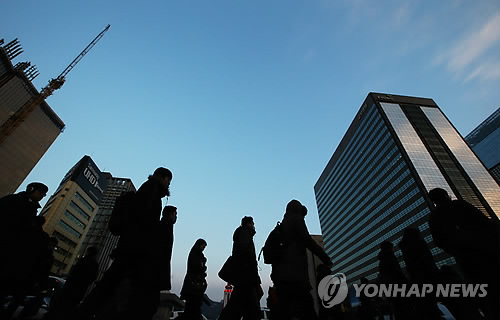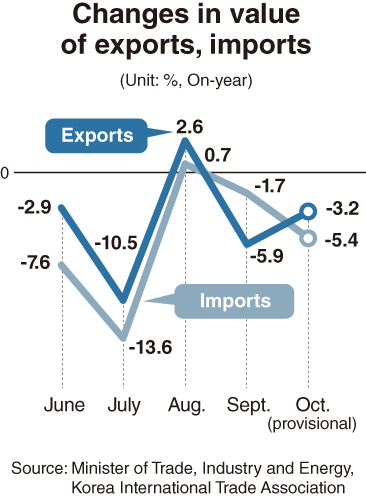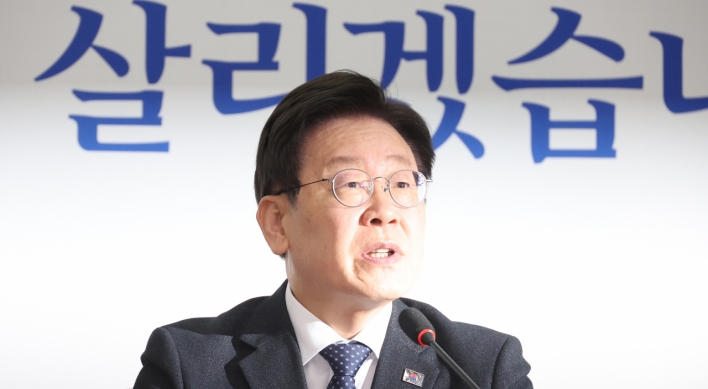[ECONOMY AT RISK] Indicators warn of economic crisis in Korea
Economy battered by Choi Soon-sil scandal, Galaxy Note 7 debacle and Hyundai Motor strike
By Korea HeraldPublished : Nov. 1, 2016 - 16:01
The Korea Herald is publishing a series of articles on the alarming state of the country’s economy and the challenges to be addressed. This is the first installment -- Ed.
Dark clouds hang over South Korea’s economy, as almost all of its economic indicators point downwards, while top economic policymakers fail to spearhead economic reforms, amid one of the country’s worst influence-peddling scandals that is shaking the core of the government.
Recent data by the Bank of Korea and the government show the Korean economy has failed to make meaningful recovery this year, with weak exports, sluggish domestic demand and snowballing household debts.

With low birth rates and aging becoming the greatest threat to the local economy, immediate signs of contraction are forecast for the fourth quarter of this year.
According to the Ministry of Trade, Industry and Energy on Tuesday, exports fell 3.2 percent in October from a month earlier. It was the second straight contraction since September.
Dwindling exports, which take up more than half of Korea’s gross domestic product, are attributed to unexpected events at Samsung and Hyundai Motor in the second half of this year.

Economists are still working to measure exactly how much of an impact Samsung’s end of its Galaxy Note 7 production and the Hyundai Motor strike will have on exports, but they say shipments of the “Big 2” Samsung and Hyundai Motor in proportion to GDP is about 30 percent.
The services account deficit widened to $2.54 billion in September from $1.45 billion a month earlier, owing to a logistics disruption caused by Hanjin Shipping’s bankruptcy, BOK data showed.
Feeling the pinch, consumers are cutting back spending on cars, food and home appliances. Consumption in September shrank 4.5 percent, the fastest fall since the 5.5 percent loss in February 2011, according to Statistics Korea.
Companies are also unwilling to expand their businesses. Facility investment declined 2.1 percent last month from a month earlier.
Industrial output also declined 2 percent in September from a year ago, showed Statistics Korea data. It was a drop for the first time in five months, following a gain for four straight months.
“Downward risks for the fourth quarter have risen with the worse-than-expected industrial output,” said economist Yoon Chang-yong at Shinhan Investment.
“While growth is stagnant, room for policy control is limited. It is difficult to expect the government to play the right role in the wake of the influence-peddling Choi Soon-sil debacle,” he said.
President Park Geun-hye’s friend Choi Soon-sil, a 60-year-old civilian, faces a range of allegations including bribery, blackmail, the illegal use of public funds and the violation of law on presidential documents.
On news of prosecutors putting Choi under emergency detention, the main bourse Kospi retreated under 2,000 during Tuesday morning trading.
“Foreign investors will be more hesitant to buy Korean stocks due to the Choi scandal but its impact will not be big enough to shake the whole economy,” said Kim Yu-kyum, an economist at LIG Investment & Securities.
GDP remained weak at 0.7 percent in the third quarter, slowing from 0.8 percent in the previous quarter, the BOK data showed. The growth was mainly supported by a construction boom.
Quarterly GDP growth remained under 1 percent for four consecutive quarters, adding to worries that Asia’s fourth-largest economy might be stuck in a low growth trap.
Manufacturing output fell 1 percent in the third quarter from the previous one, the lowest level in 7 1/2 years since 2.5 percent contraction in the first quarter of 2009 immediately after the 2008 global financial crisis.
Another notable risk is rising household debt, which is projected to shoot up to a record level of 1.3 quadrillion won ($1.14 trillion) at the end of this year. It has grown since the government’s 2014 expansionary policies prompted people to borrow at cheaper rates for housing.
Furthermore, corporate restructuring in ailing heavy industries sectors are going at snail’s pace. The government’s plans for the shipbuilding and shipping industries, announced Monday, did not include a privatization plan for debt-ridden Daewoo Shipbuilding & Marine Engineering.
In the wake of the Choi scandal the parliamentary review of the 2017 budget has been put on the back burner.
Observers worry that the 400 trillion won national budget could fail to go thorough parliamentary assessment.
“We believe the backlash in political circles, as well as the president’s fading popularity could delay the National Assembly’s passage of the 2017 budget as well as other economic reform policies in the pipeline, including corporate restructuring,” Chang Jae-chul, an economist at Citi, said in a report.
Meanwhile, the Finance Ministry said credit ratings agency Moody’s maintained South Korea’s sovereign rating at “Aa2” on Tuesday, citing a “strong position” in dealing with uncertainties in the global economic and financial markets.
By Kim Yoon-mi (yoonmi@heraldcorp.com)
Dark clouds hang over South Korea’s economy, as almost all of its economic indicators point downwards, while top economic policymakers fail to spearhead economic reforms, amid one of the country’s worst influence-peddling scandals that is shaking the core of the government.
Recent data by the Bank of Korea and the government show the Korean economy has failed to make meaningful recovery this year, with weak exports, sluggish domestic demand and snowballing household debts.

With low birth rates and aging becoming the greatest threat to the local economy, immediate signs of contraction are forecast for the fourth quarter of this year.
According to the Ministry of Trade, Industry and Energy on Tuesday, exports fell 3.2 percent in October from a month earlier. It was the second straight contraction since September.
Dwindling exports, which take up more than half of Korea’s gross domestic product, are attributed to unexpected events at Samsung and Hyundai Motor in the second half of this year.

Economists are still working to measure exactly how much of an impact Samsung’s end of its Galaxy Note 7 production and the Hyundai Motor strike will have on exports, but they say shipments of the “Big 2” Samsung and Hyundai Motor in proportion to GDP is about 30 percent.
The services account deficit widened to $2.54 billion in September from $1.45 billion a month earlier, owing to a logistics disruption caused by Hanjin Shipping’s bankruptcy, BOK data showed.
Feeling the pinch, consumers are cutting back spending on cars, food and home appliances. Consumption in September shrank 4.5 percent, the fastest fall since the 5.5 percent loss in February 2011, according to Statistics Korea.
Companies are also unwilling to expand their businesses. Facility investment declined 2.1 percent last month from a month earlier.
Industrial output also declined 2 percent in September from a year ago, showed Statistics Korea data. It was a drop for the first time in five months, following a gain for four straight months.
“Downward risks for the fourth quarter have risen with the worse-than-expected industrial output,” said economist Yoon Chang-yong at Shinhan Investment.
“While growth is stagnant, room for policy control is limited. It is difficult to expect the government to play the right role in the wake of the influence-peddling Choi Soon-sil debacle,” he said.
President Park Geun-hye’s friend Choi Soon-sil, a 60-year-old civilian, faces a range of allegations including bribery, blackmail, the illegal use of public funds and the violation of law on presidential documents.
On news of prosecutors putting Choi under emergency detention, the main bourse Kospi retreated under 2,000 during Tuesday morning trading.
“Foreign investors will be more hesitant to buy Korean stocks due to the Choi scandal but its impact will not be big enough to shake the whole economy,” said Kim Yu-kyum, an economist at LIG Investment & Securities.
GDP remained weak at 0.7 percent in the third quarter, slowing from 0.8 percent in the previous quarter, the BOK data showed. The growth was mainly supported by a construction boom.
Quarterly GDP growth remained under 1 percent for four consecutive quarters, adding to worries that Asia’s fourth-largest economy might be stuck in a low growth trap.
Manufacturing output fell 1 percent in the third quarter from the previous one, the lowest level in 7 1/2 years since 2.5 percent contraction in the first quarter of 2009 immediately after the 2008 global financial crisis.
Another notable risk is rising household debt, which is projected to shoot up to a record level of 1.3 quadrillion won ($1.14 trillion) at the end of this year. It has grown since the government’s 2014 expansionary policies prompted people to borrow at cheaper rates for housing.
Furthermore, corporate restructuring in ailing heavy industries sectors are going at snail’s pace. The government’s plans for the shipbuilding and shipping industries, announced Monday, did not include a privatization plan for debt-ridden Daewoo Shipbuilding & Marine Engineering.
In the wake of the Choi scandal the parliamentary review of the 2017 budget has been put on the back burner.
Observers worry that the 400 trillion won national budget could fail to go thorough parliamentary assessment.
“We believe the backlash in political circles, as well as the president’s fading popularity could delay the National Assembly’s passage of the 2017 budget as well as other economic reform policies in the pipeline, including corporate restructuring,” Chang Jae-chul, an economist at Citi, said in a report.
Meanwhile, the Finance Ministry said credit ratings agency Moody’s maintained South Korea’s sovereign rating at “Aa2” on Tuesday, citing a “strong position” in dealing with uncertainties in the global economic and financial markets.
By Kim Yoon-mi (yoonmi@heraldcorp.com)
-
Articles by Korea Herald







![[Hello India] Hyundai Motor vows to boost 'clean mobility' in India](http://res.heraldm.com/phpwas/restmb_idxmake.php?idx=644&simg=/content/image/2024/04/25/20240425050672_0.jpg&u=)










